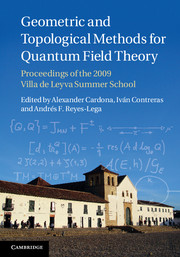 Geometric and Topological Methods for Quantum Field Theory
Geometric and Topological Methods for Quantum Field Theory Published online by Cambridge University Press: 05 May 2013
Abstract
These notes are based on a series of lectures given to a mixed audience of mathematics and physics students at Villa de Leyva in Colombia in 2009. The first half is an introduction to iterated integrals and polylogarithms, with emphasis on the case ℙ1\{0, 1, ∞}. The second half gives an overviewof some recent results connecting them with Feynman diagrams in perturbative quantum field theory.
Introduction
The theory of iterated integralswas first invented by K. T. Chen in order to construct functions on the (infinite-dimensional) space of paths on a manifold, and has since become an important tool in various branches of algebraic geometry, topology and number theory. It turns out that this theory makes contact with physics in (at least) the following ways:
the theory of Dyson series,
conformal field theory and the KZ equation,
the Feynman path integral and calculus of variations,
Feynman diagram computations in perturbative quantum field theory (QFT).
The relation between Dyson series and Chen's iterated integrals is more or less tautological. The relationship with conformal field theory is well-documented, and we discuss a special case of the KZ equation in these notes. The relationship with the Feynman path integral is perhaps the deepest and most mysterious, and we say nothing about it here. Our belief is that a complete understanding of the path integral will only be possible via the perturbative approach, and by first understanding the relationship with (2) and (4). Thus the first goal of these notes is to try to explain why iterated integrals should occur in perturbative quantum field theory.
To save this book to your Kindle, first ensure [email protected] is added to your Approved Personal Document E-mail List under your Personal Document Settings on the Manage Your Content and Devices page of your Amazon account. Then enter the ‘name’ part of your Kindle email address below. Find out more about saving to your Kindle.
Note you can select to save to either the @free.kindle.com or @kindle.com variations. ‘@free.kindle.com’ emails are free but can only be saved to your device when it is connected to wi-fi. ‘@kindle.com’ emails can be delivered even when you are not connected to wi-fi, but note that service fees apply.
Find out more about the Kindle Personal Document Service.
To save content items to your account, please confirm that you agree to abide by our usage policies. If this is the first time you use this feature, you will be asked to authorise Cambridge Core to connect with your account. Find out more about saving content to Dropbox.
To save content items to your account, please confirm that you agree to abide by our usage policies. If this is the first time you use this feature, you will be asked to authorise Cambridge Core to connect with your account. Find out more about saving content to Google Drive.